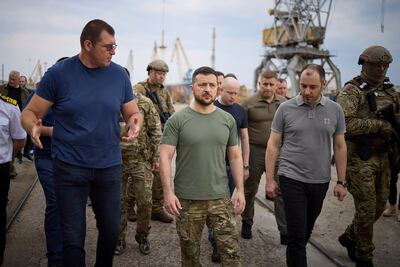Cargo ships ferrying much-needed grain supplies out of Ukraine have been offered up to $50 million in insurance by brokers in London, clearing a hurdle to getting Black Sea exports back under way.
The first ships due to sail under the UN-brokered deal are being loading and officials hope the vessels will sail next week. Insurance market Lloyd's of London, underwriter Ascot and broker Marsh said the scheme would help to ease mounting pressure on global food supplies caused by the war between Russia and Ukraine.
Russia and Ukraine signed a deal last week, brokered by Turkey and the UN, to reopen grain and fertiliser exports that have been blocked by the five-month war.
Ukraine is one of the world's most fertile countries and the standstill in the Black Sea has led to soaring food prices and fears that millions will go hungry worldwide.
UN aid chief Martin Griffiths said on Thursday he was hopeful that the first shipment of grain from a Ukrainian Black Sea port was imminent but said some details for the safe passage of vessels were still being worked out.
Chris McGill, head of cargo at Ascot, said the new financing was a “bespoke, mission-focused facility” that would help ships to sail through safe corridors from designated Ukrainian ports.
Lloyd's chief of markets Patrick Tiernan said it would “add essential protection” to the deal announced by Turkey and the UN and help address market uncertainty over grain supplies.
The cost of Black Sea insurance will vary according to cargo, shipowner and port but is likely to be steep.
Premiums to go into the broader Black Sea area have risen sharply, to as much as 5 per cent of the value of the ship from 0.025 per cent before the invasion.
Ukraine and Russia sign grain deal — in pictures
“This facility is a major development in assisting our cargo clients manage the risks associated with operating in the Black Sea during this terrible time of war,” said Marsh's head of cargo David Roe.
“Not only will it help unlock supply chains, it will alleviate mounting pressures on global food security, which will benefit nations and communities around the world.”
Optimism over last week's deal was tarnished less than 24 hours later when Russian missiles hit the port of Odesa, raising doubts about Moscow's commitment to the plan.

A group of ambassadors from G7 countries were in Odesa on Friday to call for the deal to be upheld, said British diplomat Melinda Simmons. “Russia must respect the deal,” she said.
Ukraine and Russia blame each other for laying naval mines around the Black Sea coast. The UN-Turkey deal foresees checks in neutral waters to ensure that cargo ships are not carrying weapons.
Russia is accused by the EU of deliberately bombarding grain warehouses and withholding its own supplies to gain leverage over the international community.
Moscow denies these claims, insisting it is only hitting military targets and instead argues that western sanctions are throttling global food supplies — a narrative in turn rejected by western powers.










